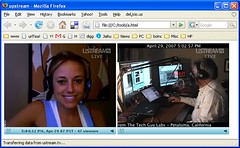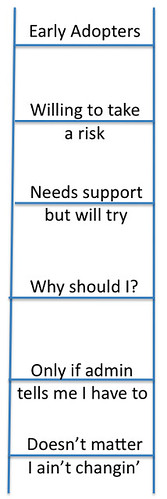
'09 Bringing social learning to the masses
 I love making predictions….I mean what the heck. If you’re wrong ah well. But if you’re right you get to act like you know what you’re talking about. 🙂
I love making predictions….I mean what the heck. If you’re wrong ah well. But if you’re right you get to act like you know what you’re talking about. 🙂
Last year I predicted that ’08 would be remembered as the year of the “Live Web”. Personally I don’t think my prediction was too far off. We saw many things go live. Ustream.tv and now Stickam.com along with a host of other sites took the web by storm. I found myself watching many events and people live. Towards the end of the year Dean Shareski made Qik a twitter hit broadcasting live events via his cell phone anywhere and anytime he felt like it. We saw many podcast shows start to use live video including Leo Laporte going live with live.twit.tv.
What we need to remember is that all of this technology is very much in its infancy stage and over the next year, I think we’ll only see it improve. On a recent TWIT podcast (one of my favorites) Jason Calacanis talked about in down economic times, companies should not expand but instead build value. I think that’s what we’re going to see from a lot of these Internet companies…not expansion but value building. They will continue to improve their products, make things faster, smoother and sit tight while the world waits to see what will happen economically.
I have a feeling that the same will happen in education. Since 2005 we’ve seen a huge influence of Web 2.0 tools. We early adopters have flocked to them, trying to figure out their value and find out for ourselves what tools can be used in educational settings and which tools ‘stick’ with students and educators alike.
In 2009 I think you are going to see us build value into these tools educationally. I’m not convinced that 2009 will be about the “next new thing” so we (the early adopters) will turn our focus to what we know. The tools, we know, can make a difference in education and we’ll help the masses understand those tools better and how being connected fundamentally changes the way we teach and learn.
Will Richardson has a similar thought about this year:
So, looking forward, I’m still in the same place in terms of where I want to spend more of my energies…not so much on the people who have already showed up, but on the people who don’t know that this production is even playing.
 And I think this is 2009 for education. I feel much the same way Will does in that this year is about reaching that next rung of adopters on the adoption ladder. We won’t have a lot of new and cool tools to try and figure out this year so it will be a time for us to build value educationally.
And I think this is 2009 for education. I feel much the same way Will does in that this year is about reaching that next rung of adopters on the adoption ladder. We won’t have a lot of new and cool tools to try and figure out this year so it will be a time for us to build value educationally.
Last year at NECC I asked many of those that were at EduBloggerCon and others I met in the Blogger Cafe what percentage of the 13,000 educators at the conference really “got it”. Everyone, would look around and say outside of those that were at EduBloggerCon…not many.
So if we take the 250 (I think that is the rough number of attendees of EduBloggerCon) out of 13,000. That’s about 2%. That’s 2% of the people who came to an educational technology conference which means these are the educators who like using technology. Will Richardson thinks it’s closer to 5%, and he might be closer to the true number. At any rate…we have some value building to do in education.
Another area within our society I think we’ll see continue to evolve is this notion of “Nearly Now” as Stephen Heppell puts it in the Learning to Change video and in an interesting article at the Guardian.
Let me offer three examples. Once, we simply had two types of time: “now” and “not now”. A school lesson happened “now”. When children talked about what they had done during the holidays they were describing “not now”. But technology has brought us a new time in between those two: “nearly now”.
Twitter hit the main stream this year with FriendFeed having a different way to aggregate the conversation. In 2009 I think we’ll see society continue to explore these tools and this new Nearly Now way of communicating. Does it have value in the classroom? I’m not sure, but this is something I think early adopters in education will continue to explore this year. We know it has value as a learning network device, as an aggregater of information…but for classroom learning….we’ll have to wait and see.
So what’s in store for me in 2009? Well much like Will I want to focus on opening the eyes of that next adopter rung on the latter. I want to help educators understand how open social learning changes the landscape in a way that is oh so powerful and at the same time oh so scary.
My work as the Educational Ambassador for Wetpaint.com is part of this. Just this morning I spent 45 minutes answering questions from those people just getting started using wikis. Everyone from a high school teacher wanting advice on how to run a discussion to a university professor asking for advice on setting up a wiki for her department.
That’s also why this year I wanted to do a 6 hour workshop at NECC 09 on using wikis. 6 hours focused just on wikis and their use in education. We’ll look at wiki projects, create a rubric that people can walk away with, and learn how to build a wiki for use as both a collaborative tool, or just as a class website. I’m excited to get 6 hours to focus and build understanding around the use of this very powerful tool….not with those who already use them, but with newbies or at least those new to wikis.
I also am making it a personal goal to create more screencasts this year. I’m finding them very useful at my school as a way to get quick snippets of information out to staff. I have to work on and find a format that works for me that will allow me to do these in under 2 minutes. I love the way Apple does their quick tip of the week screencasts and hope to follow a similar format to these.
I also see my teaching of the grad course at Plymouth State University as another way to get people into this world. In my course you don’t write an end of the term paper, you write some 30 blog posts that if added up would probably be more writing than a term paper…but the learning is what I’m really after. Most people taking the course are either technology teachers within schools or want to do something with technology. It’s been a great course with a lot of positive feedback. The one complaint I constantly receive is that the first two weeks are very overwhelming. Imagine having to learn to edit a wiki, write a blog, and set up and read an RSS reader all within two weeks, and many of the students have never heard of some of these tools. Add that in week 7, you have to create a podcast in which I give very little guidance and expect the students to use YouTube videos and other resources to learn the trade of podcasting and you have a tool intense course. I must be doing something right though as one of my former students Kim Tufts has returned as my TA this quarter and will be teaching the course this summer.
I’m also hoping to do more conferences and PD days here in the Asia region (and beyond). More schools will be starting down the path to 1:1 programs (one computer for every student) and with that (I hope) will be some PD to teach teachers how putting this tool in the hands of students does more than allow them to turn papers in electronically and save trees. There are at least 14 international schools that will be going 1:1 in the next two years here in Asia and they’ll need some support both from outside and from within to help make the transition.
So that’s it for my predictions and goals for 2009. Basically it’s time to get our hands dirty and reach a little deeper, find those next adopters in your school and go get them. This goes for administrators as well. Find that administrator and help them see the changes that are happening in our world. This economic down turn is an interesting thing to watch from my apartment in Bangkok. Nobody really knows what it means or how long it will last. My last and safest prediction is that I’m not sure how long it will last, but I have a feeling the world in many ways economically, socially, and globally is going to feel a lot different on the other side of it. It’s time to build value, and prepare for the turn around because when it does….hang on we’re gonna be in a whole new global landscape.







[…] predictions about the future of technology in K-12 Education. In his particularly thoughtful post  ’09 Bringing social learning to the masses, Thinking Stick blogger Jeff Utecht says that 2009 will be about broader adoption and more […]
I hope you’re correct in your predictions. The time period from 2005 to 2009 is already an eternity in internet years. I’m something of an outside observer, and on the one hand it’s disheartening that more educators aren’t on the early-adopter side of the spectrum. On the other hand, of course, it’s great that there are people like you urging your colleagues into the 21st century.
[…] I predicted this year would be about building value with these tools and that I personally was going to focus on bringing the conversation to people who are open to hearing it and are ready to hear it. […]
[…] of just what it means to be a “Next Gen Teacher” which lead me to the blog posts of Jeff Utecht recalling future predictions starting in 2008 for the “next generation” of teachers […]
[…] spent this year focused on bringing social learning to the masses. Which was a goal I set for myself. It wasn’t about pushing the leading edge as much as […]
[…] Of course this is my prediction, which means absolutely nothing, making it all the more fun to predict what I think this year will bring. (But I don’t think I was to far off in ‘07, ‘08 or ‘09) […]
I remember using UStream.tv to watch the release of the iPad, but I never considered it as a social learning tool. It’s a great way to push learning to “the masses” in ways I never imagined. Great post.
[…] and Facebook) 2008: The Year of the "Live Web" (Ustream.tv and other services take off) 2009: Bringing Social Learning to the Masses (Education goes deeper in understanding social connections) 2010: The Year of the Mobile […]
[…] Bringing Social Learning to the Masses (Education goes deeper in understanding social […]
[…] spent this year focused on bringing social learning to the masses. Which was a goal I set for myself. It wasn’t about pushing the leading edge as much as […]